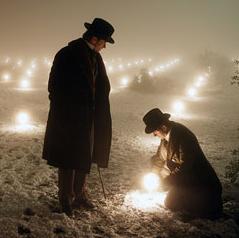 It’s a little surprising to me that not one, but two movies centered around magical illusion as an art form have made their ways into theaters in the last few months. Edward Norton’s “The Illusionist” came and went rather quickly last summer, but last weekend’s opening of director Christopher Nolan’s (“Memento”) “The Prestige” was considerably more successful. In our current fast-paced, entertainment-driven, technology-focused society, why would Hollywood think we should care about a couple of competing magicians from Victorian England who are bent on revenge? My theory is that this recent fascination with the art of illusion has at least a little something to do with our enduring desire for spiritual mystery.
It’s a little surprising to me that not one, but two movies centered around magical illusion as an art form have made their ways into theaters in the last few months. Edward Norton’s “The Illusionist” came and went rather quickly last summer, but last weekend’s opening of director Christopher Nolan’s (“Memento”) “The Prestige” was considerably more successful. In our current fast-paced, entertainment-driven, technology-focused society, why would Hollywood think we should care about a couple of competing magicians from Victorian England who are bent on revenge? My theory is that this recent fascination with the art of illusion has at least a little something to do with our enduring desire for spiritual mystery.
“The Prestige” is, at its most basic level, an intricate, occasionally well-crafted murder mystery. Early on in the film, we see magician Robert Angier (Hugh Jackman) drowning in a water tank as fellow illusionist Alfred Borden (Christian Bale) watches, refusing to help. In flashbacks, we are then taken through the tumultuous connection between these two men over the years, as they work together, then compete against each other, and, eventually, destroy each other.
While the plot is overwrought and implausible, one thing Nolan does exceptionally well with this story is examine the importance, as well as the cost, of living a life of duplicity and secrecy. These men were the movie stars of their day, and the price they pay for fame and fortune is hefty. Unlike celebrity life in today’s culture, these men realize that their careers depend on the general public not knowing anything about who they are or how they do what they do–in other words, mystery.
But from a spiritual perspective, what really struck me when I was watching this film is the explanation given for the three key elements of any good illusion. First, there is the “Pledge,” in which an ordinary object (or person) is produced and the magician promises to endow it with something unique. The there is the “Turn,” in which the object (or person) is transformed in such a way that its fate is hanging in the balance. Finally, there is the “Prestige,” in which the object (or person) is miraculously rescued or restored.
I know some people will say I am reaching here, but that sounds like a great description for the mystery of our relationship with God, at least from a Christian perspective. God creates and designs us for a purpose, we are transformed–not in a good way–by our selfishness and sin, but in the end, by God’s grace, we are restored in our relationship with him. It’s a mystery I still don’t fully comprehend.


